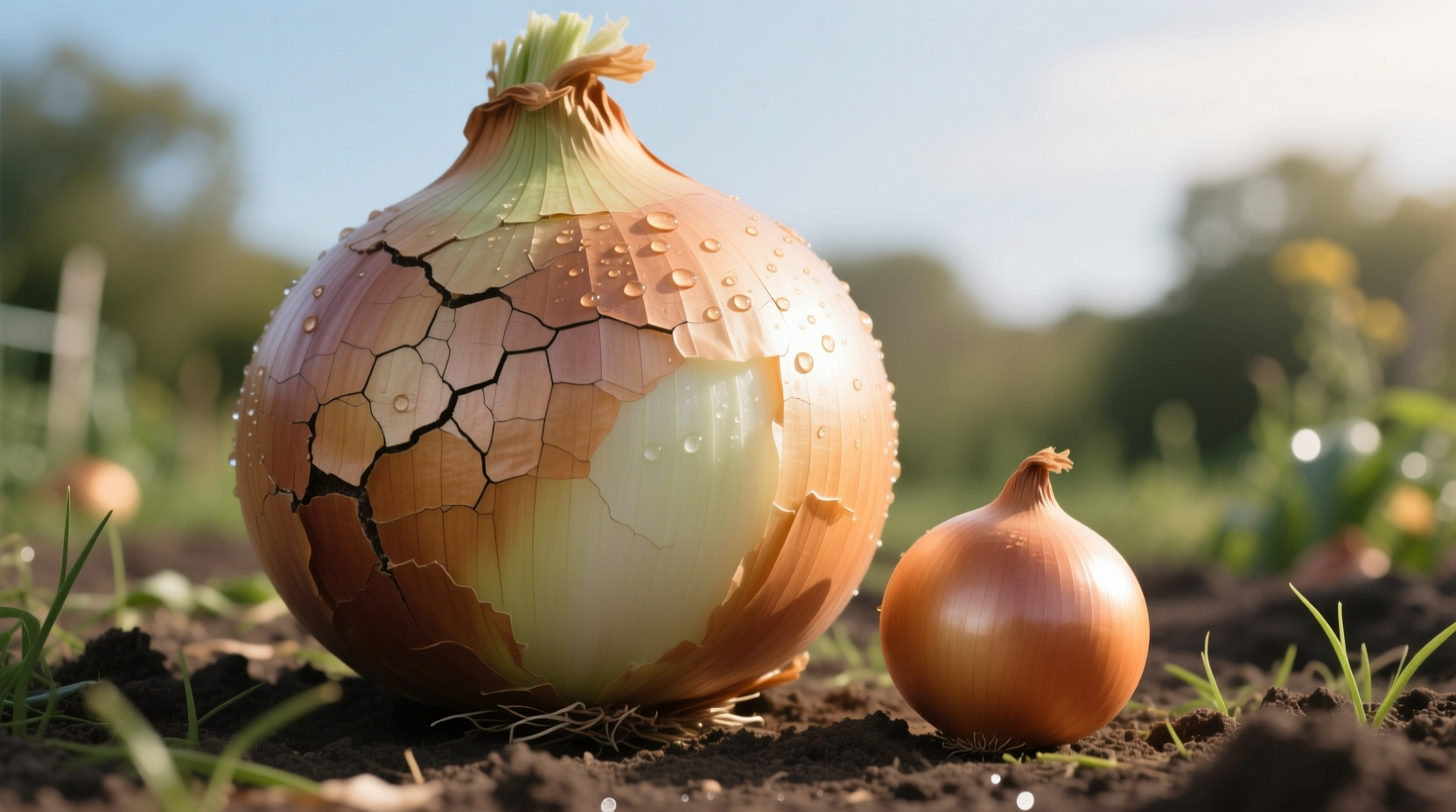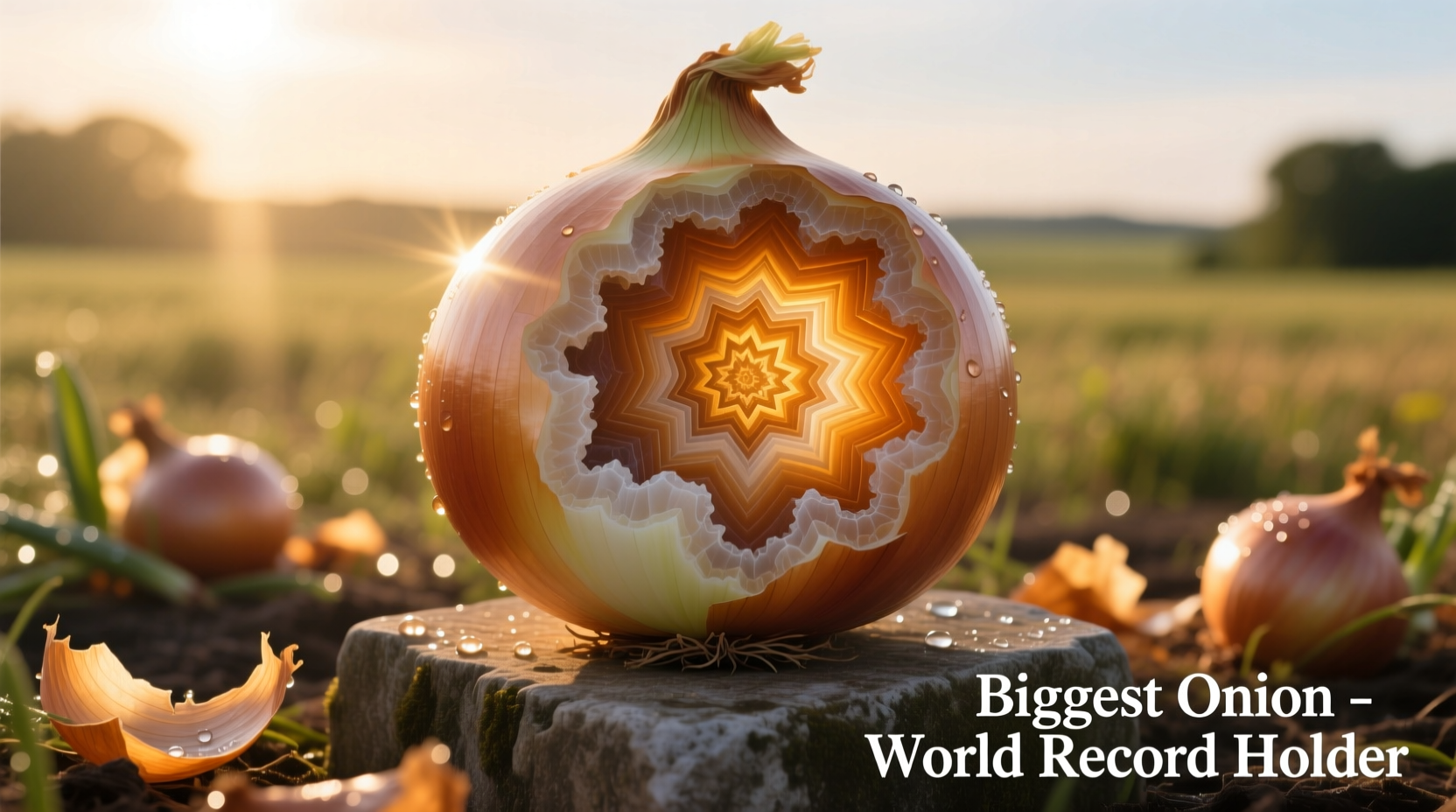The Fascinating World of Giant Onions
Onions might seem like humble kitchen staples, but competitive growers have transformed them into marvels of horticultural achievement. The pursuit of the biggest onion isn't just about breaking records—it reveals fascinating insights about plant biology, agricultural techniques, and the dedication of growers who treat onion cultivation as both science and art.
Record-Breaking Onions: A Historical Timeline
The quest for the largest onion has evolved significantly over the past few decades as growers refine their techniques and varieties. Competitive onion growing has become a serious pursuit among horticultural enthusiasts, particularly in the UK where the National Giant Vegetable Competition has spurred remarkable achievements.
| Year | Grower | Weight | Location | Notes |
|---|---|---|---|---|
| 2021 | Andy Jury | 10.71 lbs (4.86 kg) | UK | Current Guinness World Record holder |
| 2014 | Peter Glazebrook | 10.67 lbs (4.84 kg) | UK | Previous record holder, renowned giant vegetable grower |
| 2003 | Kevin Wilson | 8.92 lbs (4.05 kg) | UK | Significant jump from previous records |
| 1995 | Unknown | 5.6 lbs (2.54 kg) | USA | Early documented large onion record |
This historical progression demonstrates how cultivation techniques have dramatically improved onion size potential. According to the Royal Horticultural Society, advances in soil preparation, watering techniques, and variety selection have contributed to these impressive gains in size.
Onion Varieties Capable of Impressive Size
Not all onions have the genetic potential to reach record-breaking dimensions. Certain varieties have been specifically developed or naturally selected for their ability to form large bulbs under optimal conditions.
The University of Minnesota Extension identifies several varieties particularly suited for large bulb development:
- Ailsa Craig - A popular exhibition variety known for its potential to grow exceptionally large with proper care
- Kelsae - Another favorite among competitive growers for its reliable large bulb formation
- Stuttgarter - A traditional variety that performs well in various climates while producing substantial bulbs
- Walla Walla - Known for its sweet flavor and large size potential, particularly in the Pacific Northwest
What Makes an Onion Grow So Large?
Several critical factors determine whether an onion can reach extraordinary size:
Genetic Potential
The foundation for a giant onion begins with the right seed variety. Exhibition varieties like Ailsa Craig have been selectively bred over generations specifically for their capacity to form massive bulbs when given optimal growing conditions.
Soil Conditions
According to research from Michigan State University Extension, onions destined for record size require deeply worked, loose soil with excellent drainage. Competitive growers often create custom soil mixes with precise nutrient balances to maximize bulb development.
Growing Season Length
Long-day varieties require 14-16 hours of daylight to form bulbs properly. Growers in northern latitudes benefit from extended daylight hours during summer, giving their onions more time to develop before bulb formation begins.
Careful Cultivation Practices
Record-setting growers employ meticulous techniques including:
- Thinning plants early to give each onion maximum space
- Precise watering schedules that avoid both drought stress and overwatering
- Strategic fertilization timed to bulb development stages
- Protecting plants from pests and diseases without harmful chemicals

Can You Grow a Giant Onion at Home?
While breaking world records requires professional-level dedication, home gardeners can certainly grow larger-than-average onions with these practical techniques:
Starting Right
Begin with fresh, high-quality seeds of varieties known for size. Plant seeds indoors 8-10 weeks before your last frost date, then transplant carefully to avoid root damage that could limit growth potential.
Soil Preparation
Prepare your garden bed by working in 3-4 inches of compost and ensuring the soil is loose to at least 12 inches deep. Onions need room for their roots to spread without obstruction.
Optimal Spacing
Give each plant ample space—12-18 inches between plants—to allow maximum bulb development. This might seem excessive compared to standard onion spacing, but it's crucial for size potential.
Water Management
Maintain consistent moisture, providing about 1 inch of water per week. Avoid letting the soil dry out completely, but also prevent waterlogging which can cause rot.
Fertilization Strategy
Apply balanced fertilizer when plants are 4-6 inches tall, then switch to a low-nitrogen, high-phosphorus formula as bulbs begin forming to encourage size rather than leaf growth.
Practical Considerations for Giant Onions
While impressive, extremely large onions present some practical challenges:
- Storage limitations - Very large onions often don't store as well as medium-sized ones due to higher moisture content
- Culinary applications - Their size makes them less practical for most recipes designed for standard onions
- Flavor profile - Some growers report giant onions can be milder in flavor compared to smaller, more concentrated varieties
For everyday cooking, standard-sized onions typically offer better flavor concentration and versatility. However, giant onions make impressive centerpieces for dishes where presentation matters, such as caramelized onion tarts or roasted onion specialties.
Conclusion
The pursuit of the biggest onion represents the remarkable potential of plant cultivation when science, dedication, and favorable conditions align. While most home gardeners won't challenge the world record, understanding the techniques behind giant onion production can help anyone grow healthier, more robust onions. Whether you're aiming for competition-sized specimens or simply want to improve your garden yield, applying these principles of soil preparation, variety selection, and careful cultivation will enhance your onion-growing success.











 浙公网安备
33010002000092号
浙公网安备
33010002000092号 浙B2-20120091-4
浙B2-20120091-4